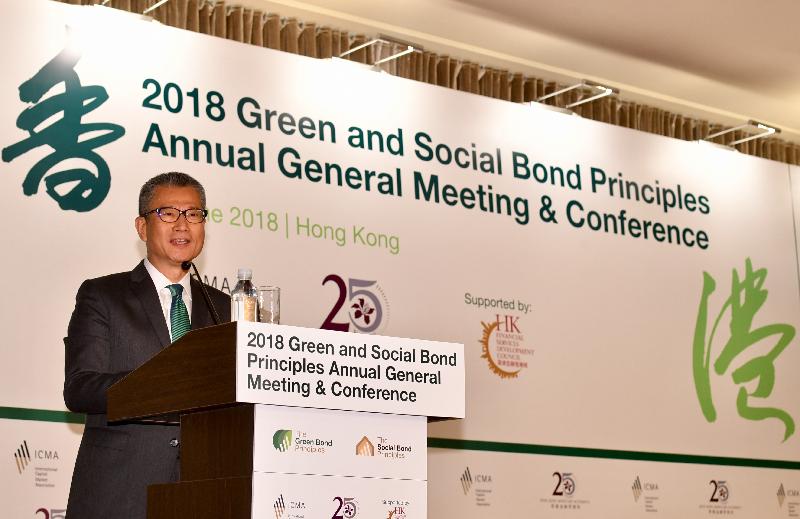Following is the speech by the Financial Secretary, Mr Paul Chan, at the 2018 Green and Social Bond Principles Annual General Meeting and Conference today (June 14):
Mr Scheck (Chief Executive of the International Capital Market Association, Mr Martin Scheck), Norman (Chief Executive of the Hong Kong Monetary Authority, Mr Norman Chan), distinguished speakers, ladies and gentlemen,
Good morning. It's a great pleasure to join you today for the fourth Green and Social Bond Principles Conference. I'm pleased to note that the Conference is taking place in Asia – right here in Hong Kong – for the very first time.
I'd say that underlines the rising prominence of sustainable and green investment, as well as the tremendous power of Asia in propelling the global economy.
It speaks, too, of Hong Kong's stature as one of the world's leading financial centres.
The green bond market has come a long good way in just over a decade. It debuted only in 2007, with the issuance of a "climate awareness bond" by the European Investment Bank.
The 2015 Paris Agreement, adopted by 195 countries, has taken it to another level, lending it both heightened urgency and broad credibility across the full spectrum of governments, financial institutions and public and private entities.
In September 2016, green finance was for the first time included on the agenda of the G20 Summit held in Hangzhou, China. The importance of green finance was rightly recognised by the G20 leaders in the communique of the summit.
Last year, the global green bond issuance was around US$160 billion, 80 per cent more than the previous year. And China, the leading advocate of green finance at G20, issued more than US$23 billion worth of green bonds last year. Today, sovereign issuance accounts for about one-third of the total in both developed and emerging markets.
I am glad to report that Hong Kong will soon join the green wave, by issuing government green bonds with a borrowing ceiling of about US$13 billion.
We will, let me assure you, do so under the best market practices, and we will encourage others to arrange financing for their green projects through our premier capital platform.
The sheer scale of capital required to meet the global, low-carbon challenge demands an international alignment of interests, incentives as well as practices, and of course, public-private collaboration.
It helps, enormously, that the Green Bond Principles, with their focus on transparency, disclosure and reporting, are creating a level playing field for investors and issuers.
Building on this foundation, many national and regional authorities governing green bond issuance are developing practices that respond to their local circumstances.
That includes Hong Kong. We are tapping our local expertise to get a head start on green finance certification.
I must say I am encouraged by the favourable market response to our first local Green Finance Certification Scheme, which was launched in January this year.
The Scheme reflects a number of widely recognised international standards, including of course the Green Bond Principles, awarding pre-issuance and post-issuance stage certificates to green-debt instruments.
And we will set up a Green Bond Grant Scheme to subsidise the costs issuers incur in using our Green Finance Certification Scheme.
Another financial incentive, the Pilot Bond Grant Scheme, offers a grant equivalent to half the expenses incurred in each eligible bond issuance.
I'm sure you'll hear more about this from the Hong Kong Monetary Authority today.
And let me add that the Asian Development Bank, the World Bank and the European Investment Bank, among other international organisations, have issued green bonds here in Hong Kong.
That gives us a bit of a head start. More importantly, our financial services sector has long earned the trust – and the capital – of the international institutions and major corporations.
We aim to build our reputation in the Guangdong-Hong Kong-Macao Bay Area, as well as the expanding economies under the Belt and Road Initiative.
I am confident that Hong Kong will, soon enough, be well known for green finance as we are now counted on for capital formation prowess, our offshore Renminbi products, and our many attractions as a global centre for IPOs (initial public offerings).
In short, ladies and gentlemen, we see green as the new gold not just for our economy but also for our community and our common future.
I wish you all a very fruitful conference today.
Thank you.

